 Petzlover
Petzlover Catahoula Bulldog is originated from United States but Spitz is originated from Russia. Both Catahoula Bulldog and Spitz are having almost same height. Catahoula Bulldog may weigh 6 kg / 14 pounds more than Spitz. Both Catahoula Bulldog and Spitz has same life span. Catahoula Bulldog may have less litter size than Spitz. Catahoula Bulldog requires Low Maintenance. But Spitz requires Moderate Maintenance
Catahoula Bulldog is originated from United States but Spitz is originated from Russia. Both Catahoula Bulldog and Spitz are having almost same height. Catahoula Bulldog may weigh 6 kg / 14 pounds more than Spitz. Both Catahoula Bulldog and Spitz has same life span. Catahoula Bulldog may have less litter size than Spitz. Catahoula Bulldog requires Low Maintenance. But Spitz requires Moderate Maintenance
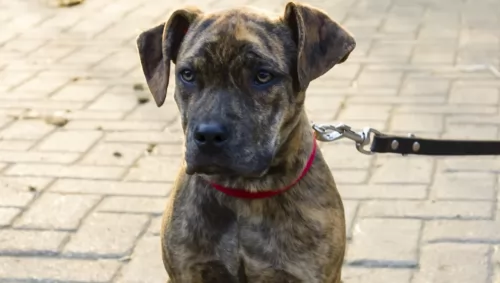 Long ago, ranchers kept the Catahoula Leopard to catch and carry prey, but because it lacked the strength to do so, they would include other stronger dogs in the pack. The American bulldog was more well built, stronger and more aggressive, and the idea was to mix the American Bulldog with the Catahoula Leopard Dog. This brought about the Catahoula Bulldog which has been in existence for some 100 years.
Long ago, ranchers kept the Catahoula Leopard to catch and carry prey, but because it lacked the strength to do so, they would include other stronger dogs in the pack. The American bulldog was more well built, stronger and more aggressive, and the idea was to mix the American Bulldog with the Catahoula Leopard Dog. This brought about the Catahoula Bulldog which has been in existence for some 100 years.
The Catahoula Bulldog became known for its stamina and strength and in 1951 the breed registry started. As a hybrid, the Catahoula Bulldog isn’t officially recognized by the American Kennel Club.
 A spitz is not a breed of dog, but rather a “group or family” of dogs that has its roots in Germany. Within this family there are a variety of breeds that were bred for very specific purposes by people in many different parts of the world. The spitz family can be toy dog size up to vey large. Examples run from the Pomeranian to the Canadian Eskimo Dog.
A spitz is not a breed of dog, but rather a “group or family” of dogs that has its roots in Germany. Within this family there are a variety of breeds that were bred for very specific purposes by people in many different parts of the world. The spitz family can be toy dog size up to vey large. Examples run from the Pomeranian to the Canadian Eskimo Dog.
The Spitz family dogs share the look of thick, long fur and pointed muzzles, ears and curly tail. Despite their German name, they are thought to originally be of East Asia or Artic descent. Most of today’s spitz are from Siberia’s Artic region, first described in 1788 and in English in 1792. Spitz have been bred for three types of jobs depending upon where they were developed. These jobs included pulling, herding and hunting.
There are very powerful and large Spitz breeds that pull or hunt large game. Examples of these breeds are the Swedish Elkhound, the Akita Inu, the Norwegian Elkhound and the Karelian Bear Dog. The smaller sized breeds like the Samoyed hunted small mammals and birds, while the Finnish Lapphund, Lapponian Herder, and Swedish Lapphund herded, hunted and pulled small sleds.
The three largest spitz also pulled sleds throughout the 17th and 18th centuries. In most places the Canadian Eskimo Dog, the Alakan Malamute and the Greenland dog were used in sled racing and fur trapping while in Canada and Alaska the Siberian Husky was used for the same things.
Recently there have been genetic tests that show a large number of dogs that are considered Spitz type so share many strong ancestral ties and DNA similarities with wild wolves. It is now believed that a lot of these breeds were intentionally mated with wolves and some were accidental. Both domestic and wild dogs are included in this history.
Most spitz are made for cold weather, even today’s lapdogs, like the Pomeranian, do not do well in hot climates.
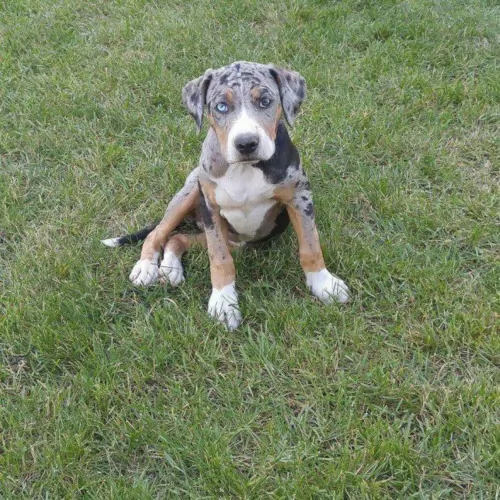 The Catahoula Bulldog is a strong-looking, medium- sized dog of 55-66cm in height and weighing in at 34-46kg. He has a short, smooth, water-repellent coat. The coat can be in a number of colors – white, brown, black or grey or he can be bi-colored such as in brown and black or white and black.
The Catahoula Bulldog is a strong-looking, medium- sized dog of 55-66cm in height and weighing in at 34-46kg. He has a short, smooth, water-repellent coat. The coat can be in a number of colors – white, brown, black or grey or he can be bi-colored such as in brown and black or white and black.
The dog appeals to a lot of people because it sheds very little. The ears of the Catahoula Bulldog are somewhat floppy and the long tail is mostly docked. The dog has unusual eyes and these can be brown, but also in shades of blue or green or even a combination of these colors.
This is a relaxed dog breed but having said that, he is also a protective breed, and then his fearless qualities come out. He becomes alert to strange noises. He is loyal and intelligent and loves to spend time with his human family. He is somewhat stubborn and independent, and early training and socialization should be provided. This ensures he is even more amicable around children in the home as well as around pets.
 Most of the spitz breeds share a “look” that includes erect ears, stocky heavy, usually double coats, a pointed muzzle, thick, fluffy ruffs and a heavy curled tail carried high over the body. Build for northern climates they are insulated by a undercoat that is waterproof and dense and a less dense topcoat. Their ears are small to prevent frostbite and their paws have thick fur to protect them in the frigid, icy terrain.
Most of the spitz breeds share a “look” that includes erect ears, stocky heavy, usually double coats, a pointed muzzle, thick, fluffy ruffs and a heavy curled tail carried high over the body. Build for northern climates they are insulated by a undercoat that is waterproof and dense and a less dense topcoat. Their ears are small to prevent frostbite and their paws have thick fur to protect them in the frigid, icy terrain.
Many still have wolf-like looks and tendencies. Some are very difficult to train to be companions – the Akita, Chow and especially the Karelian Bear Dog – fall into this category. Many mixed breed dogs are also considered members of the Spitz family. These dogs are easy to recognize as spitz because of these physical characteristics
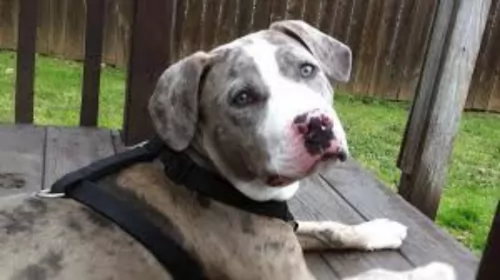 The Catahoula Bulldog is such an all-round dog breed – he loves to work and be active but he also loves to be with his human family. He is smart, active, loving and devoted and makes a splendid working dog or human companion, though he will always need to be kept busy.
The Catahoula Bulldog is such an all-round dog breed – he loves to work and be active but he also loves to be with his human family. He is smart, active, loving and devoted and makes a splendid working dog or human companion, though he will always need to be kept busy.
He is a healthy dog breed too, and is actually low maintenance which is just one of the many advantages of keeping him as a pet.
For all that he offers you, it is up to you as a responsible dog owner to provide him with a loving and nurturing environment so that he can continue to live up to the high standards this dog breed is known for.
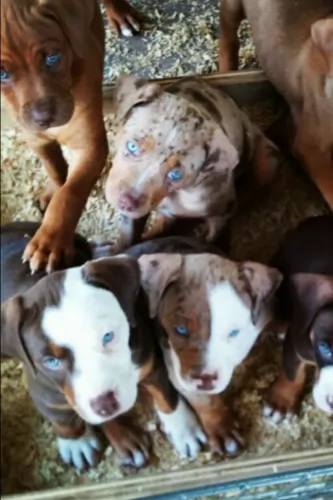 The Catahoula Bulldog is known to be a robust dog breed, full of energy. With good care – healthy diet, clean, fresh water and love and attention – he can live up to be between 10 and 16 years of age.
The Catahoula Bulldog is known to be a robust dog breed, full of energy. With good care – healthy diet, clean, fresh water and love and attention – he can live up to be between 10 and 16 years of age.
However, with every dog breed there will be some common dog ailments to watch for and these include hip dysplasia, some eye disorders and congenital heart defects. Some Catahoula Bulldogs can become deaf in one ear, or blind in one eye.
 It is a little harder to characterize the health issues of a family of dogs than it is a .will overheat in hot climates due to their double coats. Here are some propensities of dogs in the Spitz family.
It is a little harder to characterize the health issues of a family of dogs than it is a .will overheat in hot climates due to their double coats. Here are some propensities of dogs in the Spitz family.
• Thrombopathia bleeding disorder with the risk of a hemorrhage, platets don’t clot.
• Larger breeds are affected by Elbow and Hip dysplasia that can cause arthritis and lameness.
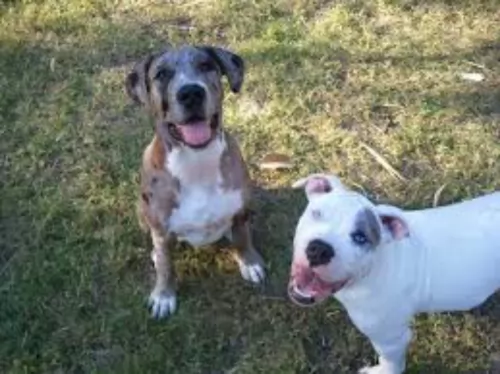 The energy levels of the Catahoula Bulldog are high and he is going to need ongoing mental- and physical stimulation. He wants to be part of all the activities in the family and you will need to take him for walks or take him with you when you go cycling or jogging. He’ll love to join in with all kinds of ball games.
The energy levels of the Catahoula Bulldog are high and he is going to need ongoing mental- and physical stimulation. He wants to be part of all the activities in the family and you will need to take him for walks or take him with you when you go cycling or jogging. He’ll love to join in with all kinds of ball games.
The best kind of environment for the Catahoula Bulldog is a country home with lots of fields to run in, but if you keep him in the city, he can do well provided you make sure to include plenty of daily exercise activities for him.
The short, smooth coat of the Catahoula Bulldog won’t require much grooming, so a good brush twice a week will be excellent for this dog who will just love the interaction this activity brings.
Ensure that your Catahoula and Bulldog mix has food which is full of vitamins and minerals as he is an energetic dog. If you make use of a commercially manufactured product, make sure it is one of the top quality ones guaranteed to ensure good health.
Don’t just put a bowl of dog pellets in front of your dog day after day, but make it interesting and nutritious for your pet by adding in raw meat, rice, vegetables and some cooked meat from time to time. An adult dog can be fed once or twice a day.
 1Feeding the puppy The Spitz family has high energy needs but in a slow-release so they need protein more than grain. Puppies should be fed 3-4x a day in small meals. Don’t overfeed them.
1Feeding the puppy The Spitz family has high energy needs but in a slow-release so they need protein more than grain. Puppies should be fed 3-4x a day in small meals. Don’t overfeed them.
2.Feeding the adult – The Spitz type dog stores their energy to use in extended periods when working or playing. They will become obese if overfed or if they don’t get enough exercise. Feed 2-3X a day in small or medium sized meals, even the larger breeds because of their storage of calories.
4. Games and Exercises – Having been bred for endurance and stamina most Spritz breed need plenty of exercise, lots of space and lots of play. They love to run, jog, or play games. They are outdoors types who love to hike, and run or walk for long times over long distances. They are great in cold, wet weather but not so good in the heat. How much exercise they need depends on the size and history of the specific breeds. Most love to play with other dogs, so dog parks and dog day care can both be good choices for most of them. Agility, barnhunt, field trials, pulling games are all good choices.